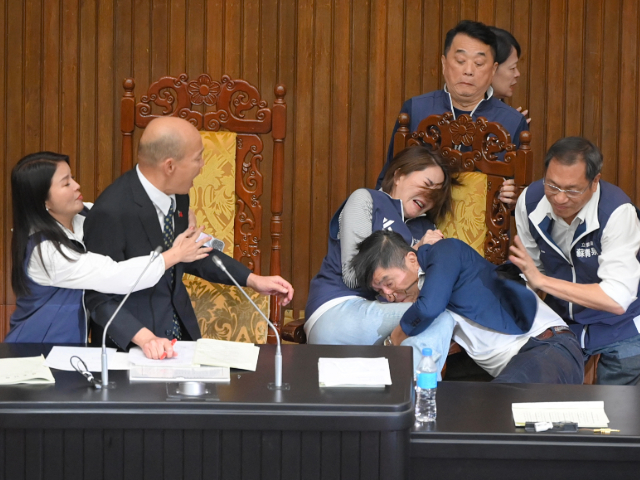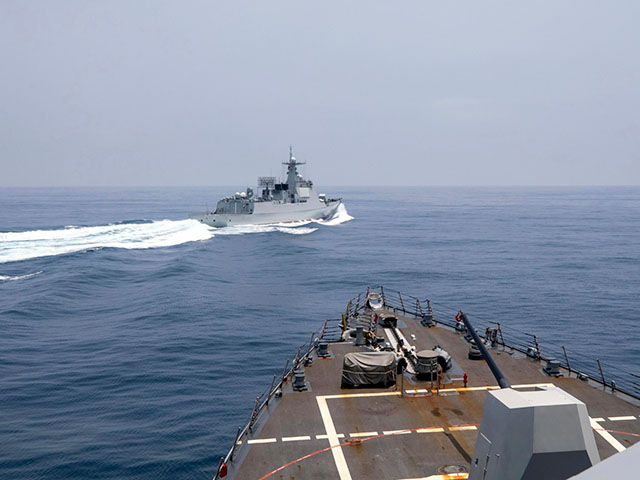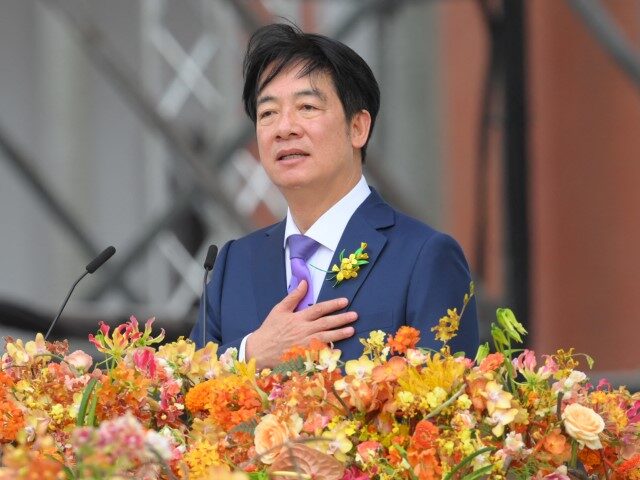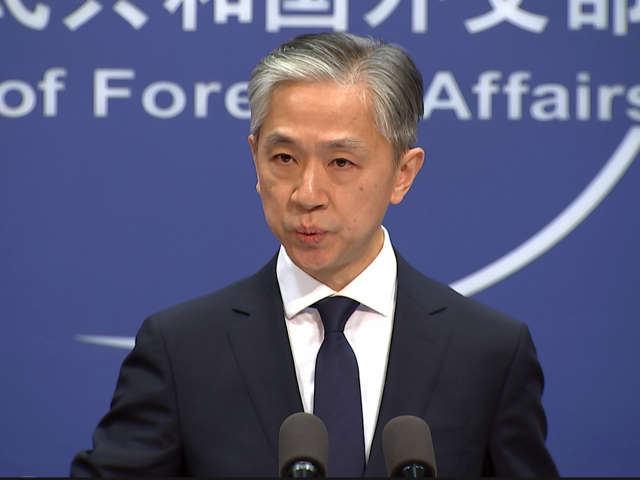President Lai Ching-te of Taiwan, often known by his Western name William Lai, delivered his inaugural address on Monday morning.
Lai called on the People’s Republic of China (PRC) to cease its campaign of “political and military intimidation against Taiwan” and to “ensure the world is free from the fear of war.”
Lai won a solid victory against two left-wing rivals in the January election, although his Democratic Progressive Party (DPP) did not fare as well in parliamentary races. Lai succeeded outgoing DPP President Tsai Ing-wen to “break the eight-year curse,” as he said in his inaugural speech. No other party in Taiwan’s democratic history has been able to hold the presidency for more than eight years.
“The reality is that, in a democracy, the people have the final say,” Lai said on Monday. “There is no such thing as a ‘curse’ in any election. It is simply that the people put the ruling party under the toughest of tests, choosing the nation’s future in the most genuine way.”
Lai acknowledged that Taiwan’s history as a vibrant multi-party democracy, flourishing in the long and cold shadow of the authoritarian PRC, is also shorter than younger people might realize. He noted that Taiwan’s first democratically elected president took office in 1996 and there have only been three transitions of power between political parties since then.
“Every day of my term, I will strive to prove myself as someone in whom you can trust and count on, by acting justly, showing mercy, and being humble, and by treating our people as family,” he promised.
“In February this year, a new Legislative Yuan was sworn in. This is the first time in 16 years that no party has an absolute majority. In the face of this new political landscape, some are feeling anticipation, while others are anxious,” he acknowledged.
“I want to say to everyone that this new structure is a result of the people’s choice. Looking at it with a different frame of mind, a lack of absolute majority means that the ruling and opposition parties are now all able to share their ideas, and that we will be undertaking the nation’s challenges as one,” he said.
Lai expressed a desire for the legislature to “observe procedural justice” and asked the political majority and minorities to respect each other to “maintain a stable and harmonious society.”
This may have been an arch reference to the brawl that broke out in the Legislative Yuan on Friday over a proposal to give the legislature more oversight powers – a proposal derided by its opponents as a bid by opposition leaders to hamstring Lai’s administration before he took office.

Taiwan’s ruling Democratic Progressive Party (DPP) lawmaker Chung Chia-pin (R in blue) grabs main opposition Kuomintang (KMT) Chen Ching-hui as Parliament Speaker Han Kuo-yu (2nd-L) looks on during the voting for the Parliament reform bill at Parliament in Taipei on May 17, 2024. (SAM YEH/AFP via Getty Images)
Lai used his inaugural speech to stress Taiwan’s importance as a force for democracy, peace, and human rights, especially in a world rocked by conflicts such as Russia’s invasion of Ukraine and the Israeli self-defense operation in Gaza – and a world in which communist China is increasingly belligerent toward Taiwan.
Lai thanked the United States for supporting Taiwan and maintaining the freedom of navigation across the Indo-Pacific region, and promised to do his part by avoiding provocations – an important passage to his speech given his portrayal as a wild-eyed “separatist” in Chinese propaganda.

The USS Chung-Hoon observes a Chinese navy ship conduct what it called an “unsafe” Chinese maneuver in the Taiwan Strait, Saturday, June 3, 2023, in which the Chinese navy ship cut sharply across the path of the American destroyer, forcing the U.S. ship to slow to avoid a collision. The incident occurred as the American destroyer and Canadian frigate HMCS Montreal were conducting a so-called “freedom of navigation” transit of the strait between Taiwan and mainland China. (Mass Communication Specialist 1st Class Andre T. Richard/U.S. Navy via AP)
In return, the new Taiwanese president called on China to halt its “gray zone” campaign of intimidation and join his government in shouldering “the global responsibility of maintaining peace and stability in the Taiwan Strait.”
Lai asked his people to be realistic about the chances of the PRC agreeing to his plea for peace:
Taiwanese are a peace-loving people who treat others with kindness. I have always believed that if the leader of a country puts the people’s welfare above all, then peace in the Taiwan Strait, mutual benefits, and prosperous coexistence would be common goals.
Therefore, I hope that China will face the reality of the Republic of China’s existence, respect the choices of the people of Taiwan, and in good faith, choose dialogue over confrontation, exchange over containment, and under the principles of parity and dignity, engage in cooperation with the legal government chosen by Taiwan’s people. This can start from the resumption of tourism on a reciprocal basis, and enrollment of degree students in Taiwanese institutions. Let us together pursue peace and mutual prosperity.
My fellow citizens: As we pursue the ideal of peace, we must not harbor any delusions. So long as China refuses to renounce the use of force against Taiwan, all of us in Taiwan ought to understand, that even if we accept the entirety of China’s position and give up our sovereignty, China’s ambition to annex Taiwan will not simply disappear.
Much of Lai’s inaugural address was a promise to continue the policies of his predecessor, from strengthening national defense to maintaining a leadership position in high-tech industries, including artificial intelligence (AI) research.
Lai envisioned Taiwan evolving from the “silicon island,” where the world’s vital computer chips are made, into an “AI island” that develops new methods of harnessing AI power to “make our nation, our military, our workforce, and our economy stronger.”
“Taiwan has an influence on global economic development, as well as humanity’s well-being and prosperity,” he observed.
In the concluding passages of his address, Lai stood firm on the matter of Taiwanese sovereignty, and called on all Taiwanese to “oppose annexation” and refrain from “giving up our national sovereignty in exchange for political power” – a pointed jab at his more PRC-friendly rivals in an otherwise conciliatory speech.
“As more countries around the world publicly express their support for Taiwan’s meaningful international participation, there is increasing proof that Taiwan is a Taiwan of the world; that Taiwan is a worthy and reliable force for global peace and prosperity,” he declared, asking the audience to give a round of applause to all of the island’s foreign friends.
Lai’s inauguration was attended by representatives from the United States, United Kingdom, Japan, Germany, Canada, and the dozen other nations that still have formal relations with Taiwan after a bruising eight-year campaign by the PRC to peel off Taiwan’s allies.
The PRC responded to Lai’s inaugural address by sneering that “Taiwan independence leads nowhere.”
“No matter what banner or pretext the separatists use, ‘Taiwan independence’ is doomed to failure,” Chinese Foreign Ministry spokesman Wang Wenbin said on Monday.
“Taiwan is not a country. It has been an inalienable part of China’s territory since ancient times,” Wang said, launching into a lengthy diatribe against American efforts to help Taiwan maintain its autonomy.
“China will and must achieve reunification. No one or force can hold it back. Our message to some in the US: The trend of the world is surging forward. Those who follow the trend will prosper; those who go against it will perish,” Wang said.
Wang blew up again later in his press conference, demanding that all nations seeking good relations with the Communist regime in Beijing must reaffirm their commitment to the “One China principle” – the false claim that Taiawn is a province of China – and reject “external interference in the Taiwan question.”
“The political manipulation and self-serving stunts on the Taiwan question by certain politicians in a handful of countries grossly interfere in China’s internal affairs and violate the one-China principle. China strongly condemns this and will take all necessary measures to firmly uphold national sovereignty and territorial integrity,” Wang railed.


COMMENTS
Please let us know if you're having issues with commenting.